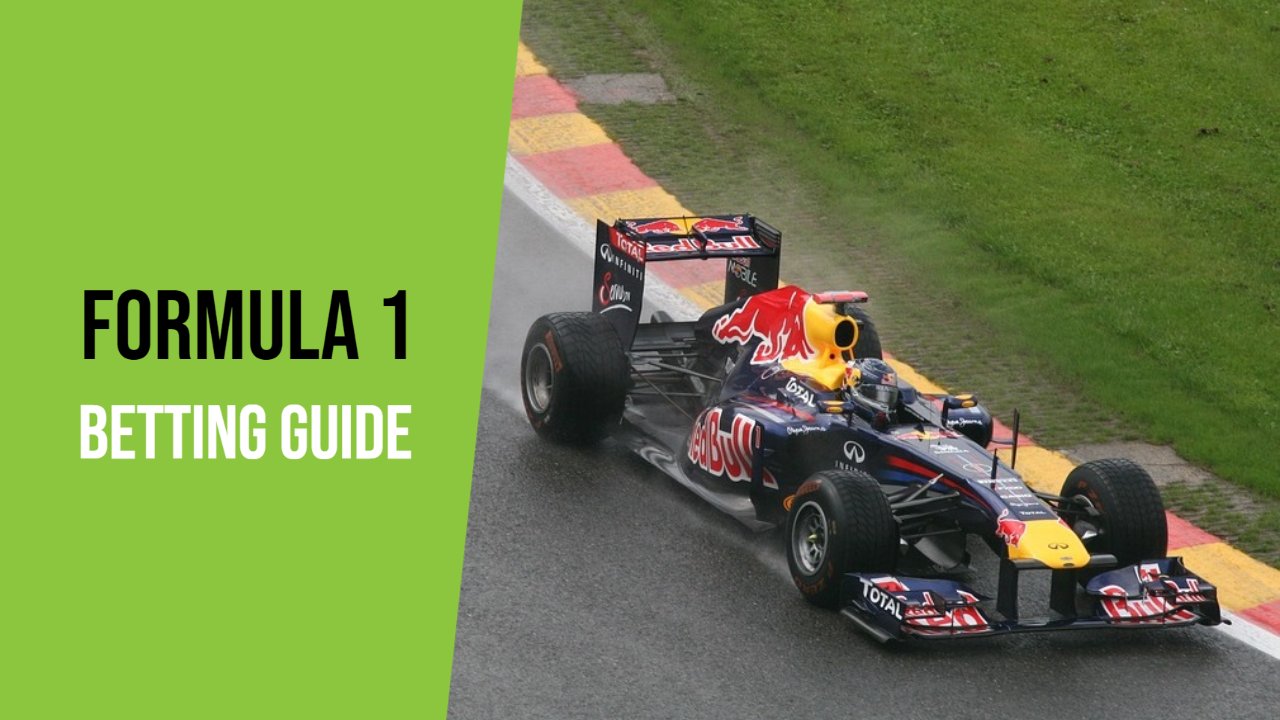
This Formula 1 betting guide highlights the key factors that influence race outcomes and explores how bettors can make informed decisions using technical data, performance trends, and race-day conditions. You’ll also find trusted resources for F1 statistics, helping you identify value in a fast-changing and highly competitive sport.
About F1 Betting
Formula 1 (F1) betting involves placing stakes on the outcomes of individual races, driver battles, team performances, and season-long championships. While outright winner markets remain popular, there are also bets available on podium finishes, fastest laps, pole position, head-to-head matchups, safety car appearances, and more.
As one of the most globally recognised motorsports, F1 attracts millions of viewers across multiple continents. The sport’s appeal stems from a combination of elite driving talent, cutting-edge engineering, and unpredictable variables such as weather, strategy, and mechanical reliability — all of which create varied and engaging betting opportunities.
Why Bet On F1?
-
Tactical Complexity
Races are influenced by tyre strategy, pit stops, team orders, and fuel management — offering multiple angles for analytical bettors to exploit.
-
Data-Driven Analysis
F1 is one of the most technically analysed sports in the world. Sector times, telemetry data, and track history allow for precise pre-race research and betting predictions.
-
Live Betting Potential
With race strategies evolving in real time, live betting markets give punters the chance to react to changing conditions, crashes, or pit stop errors.
-
Global Coverage
The F1 calendar spans different continents, climates, and track types — giving knowledgeable bettors an edge based on circuit-specific trends and historical performance.
-
Variety of Markets
From outright race winners to constructor head-to-heads and qualifying props, there’s a wide selection of betting markets for every session of the weekend — including practice, qualifying, and race day.
Popular F1 Competitions
The FIA Formula One World Championship features over 20 Grands Prix each season, with races held across a variety of circuits worldwide. Highlights include:
- Australian Grand Prix – Opens the season in Melbourne. Early reliability issues and limited recent form can lead to unpredictable results.
- Monaco Grand Prix – A tight street circuit with minimal overtaking. Grid position is crucial, making qualifying markets especially important.
- Canadian Grand Prix – Often features mixed weather and safety cars. Great for live betting and opportunistic podium finishes.
- British Grand Prix – Held at Silverstone, a high-speed, high-downforce track. Strong home support and variable weather influence betting sentiment.
- Belgian Grand Prix – Spa-Francorchamps is long and weather-sensitive. Sector-specific rain makes this race ideal for live strategy-based bets.
- Italian Grand Prix – Monza favours straight-line speed and slipstreaming. Qualifying surprises and late overtakes are common.
- Singapore Grand Prix – A slow, technical night race with high attrition. Safety cars are frequent, often reshaping the race outcome.
- United States Grand Prix – Austin’s layout promotes overtaking. Timing of upgrades and tyre wear often affect mid-race momentum.
- Mexican Grand Prix – High-altitude conditions affect engine and brake performance. Cooling issues can disrupt favourites.
- Abu Dhabi Grand Prix – Season finale at Yas Marina. Title deciders and driver retirements make it an unpredictable betting opportunity.
Best Bookmakers for F1 Betting
I recommend the following bookmakers for placing Formula 1 bets:
#ad ● 18+ ● Play Safe ● GambleAware.org
#ad ● 18+ ● Play Safe ● GambleAware.org
#ad ● 18+ ● Play Safe ● GambleAware.org
#ad ● 18+ ● Play Safe ● GambleAware.org
#ad ● 18+ ● Play Safe ● GambleAware.org
#ad ● 18+ ● Play Safe ● GambleAware.org
New UK customers. Min £10 first deposit. Place a bet of £10 at min odds of 2.0 and get £40 in Free Bets within 48 hours. Restrictions apply. Full T&Cs apply, 18+. BeGambleAware.org
#ad ● 18+ ● Play Safe ● GambleAware.org
#ad ● 18+ ● Play Safe ● GambleAware.org
#ad ● 18+ ● Play Safe ● GambleAware.org
#ad ● 18+ ● Play Safe ● GambleAware.org
Considerations for F1 Betting
Formula 1 betting is far more than backing the fastest car. Each race weekend is shaped by a complex mix of variables — including weather, team strategy, track layout, and regulatory constraints. Understanding how these factors influence race outcomes is key to spotting value across a wide range of markets.
Track Conditions
Each circuit presents unique challenges, and external conditions often dictate how the race unfolds:
- Temperature: Affects tyre degradation and grip. Warmer tracks favour softer compounds, while cooler conditions can lead to longer stints and unexpected pit strategies.
- Rain: Introduces unpredictability. Wet races increase the chance of crashes, safety cars, and shock results — especially valuable for live or podium betting.
- Wind: Strong gusts impact car balance, particularly in high-speed corners. Crosswinds can hurt teams relying on finely tuned aerodynamics.
- Altitude: High-altitude circuits (e.g. Mexico City) reduce engine power due to thinner air, affecting turbo efficiency and brake cooling.
- Humidity: Can strain cooling systems and impact tyre grip. It also increases the likelihood of driver fatigue in long races like Singapore.
Car Performance
The car’s underlying pace — both in qualifying and race trim — heavily shapes the betting markets. But it’s not just about raw speed:
- Top speed vs cornering: Some teams build cars suited to low-drag (Monza), others to high-downforce circuits (Monaco). Track-specific form matters.
- Aerodynamics: Determines how well a car handles in traffic. Poor airflow management often leads to overheating and tyre wear — key for live betting.
- Engine performance: Power unit reliability and deployment strategies affect acceleration out of slow corners and performance on long straights.
- Tyres: Different compounds wear at different rates. Teams that manage degradation well tend to gain advantage in the second half of races — ideal for late overtake or pit strategy bets.
Driver Skill & Form
While car performance matters most, a skilled driver can extract more from their machinery than the average teammate. Key attributes include:
- Racecraft: Drivers who manage traffic, DRS usage, and clean overtakes are more likely to outperform teammate or head-to-head markets.
- Consistency: Keeping errors to a minimum across sessions reduces penalties and improves qualifying position — valuable in matchups and qualifying props.
- Adaptability: Drivers who adjust quickly to changing conditions (e.g. drying tracks or red flag restarts) offer upside in volatile races.
- Mental sharpness: Drivers under contract pressure or coming back from crashes may underperform — look for psychological edge or vulnerability.
Team Orders & Hierarchy
F1 teams often favour one driver over another — especially when title stakes are high. These internal dynamics can quietly shape race outcomes and offer value in head-to-head and live betting markets.
- No.1 status: Lead drivers typically get first call on strategy, pit stops, and team support — particularly in championship-contending teams.
- Hold position: Drivers may be instructed not to battle teammates, influencing podium, points, or fastest lap outcomes.
- Team goals first: Constructors’ points often take priority over individual ambition — especially late in the season.
- Market blind spots: Bookmakers rarely price in team politics. You can find value when a support driver is unlikely to challenge the lead car.
Race Strategy
Race strategy has a huge influence on outcomes, particularly when overtaking is limited. Bettors should evaluate:
- Number and timing of stops: Two-stop strategies may work better on high-degradation tracks, while one-stoppers suit durable tyres and safety car-prone races.
- Undercuts vs overcuts: Some teams favour early pit stops to gain track position, others stretch stints to attack late — relevant in lap leader or in-play odds.
- Pit crew speed: Mistakes in the pits can cost 3–5 positions. Some teams consistently execute faster stops — useful for podium or top-six bets.
- Virtual/Full Safety Car triggers: Well-timed pit stops under neutral conditions can produce huge gains — live betting value often lies here.
Technical Regulations
F1 operates under strict technical regulations that affect both car design and performance. Bettors should keep an eye on:
- Rule changes: Mid-season aerodynamic tweaks or floor height changes can shift the pecking order suddenly.
- Component limits: Exceeding engine or gearbox allocations incurs grid penalties — key when betting on qualifying or finish position markets.
- Safety and ride height directives: Measures such as anti-porpoising rules can favour certain chassis designs over others.
- Upgrades & reliability: Teams bringing new parts to a weekend may gain performance — but also face teething issues. Keep track of Friday practice outcomes.
Team Budget & Resources
Money matters in Formula 1 — even with the cost cap in place. Teams with stronger infrastructure and development pipelines tend to outperform across the season:
- Car development: Top teams like Red Bull, Mercedes, and Ferrari upgrade more frequently and with better results. Smaller teams tend to fall back after mid-season.
- Simulator accuracy: Well-funded teams have better data correlation, leading to improved setup decisions — key for qualifying speed and tyre longevity.
- Staffing depth: Larger teams can react faster to weather, safety car timing, or damage — giving an edge in chaotic races.
- Sponsorship & politics: Influence behind the scenes occasionally shapes rule enforcement or driver decisions — especially during title runs or contract disputes.
F1 Betting Markets
Formula 1 offers a variety of markets, from race-day outcomes to season-long predictions. These are the most common options:
- Race Winner: Bet on which driver will win the Grand Prix.
- Podium Finish: Back a driver to finish in the top three.
- Top 6 / Top 10 Finish: Bet on a driver to place inside the points-paying positions.
- Fastest Lap: Predict which driver will record the quickest lap during the race.
- Pole Position: Wager on who will qualify fastest on Saturday.
- Head-to-Head: Choose which of two drivers will finish higher in the race.
- Drivers’ Championship: Season-long market on who will be crowned world champion.
- Constructors’ Championship: Bet on the team that will score the most points over the season.
Best Sites for F1 Stats
These websites offer free statistics, race data, and performance records to support your F1 betting research:
To explore these in more detail, visit: Best Sites For Free F1 Statistics
Formula 1 FAQ
Formula 1 is the highest level of single-seater motorsport, with 20 drivers representing 10 teams. Each car is custom-built with cutting-edge technology and competes in a series of Grands Prix across multiple countries.
Each race weekend includes practice sessions, qualifying (to determine grid position), and the main race. Drivers and teams earn points based on finishing positions, with titles awarded for the Drivers’ and Constructors’ Championships.
Current leading drivers include Max Verstappen, Lewis Hamilton, Charles Leclerc, Fernando Alonso, and Lando Norris. Former greats include Michael Schumacher, Ayrton Senna, Alain Prost, and Sebastian Vettel.
Leading teams include Red Bull Racing, Mercedes-AMG, Ferrari, and McLaren. These teams typically have the strongest resources, engineering capabilities, and most consistent results.
The FIA (Fédération Internationale de l’Automobile) is the governing body of Formula 1. It sets the rules for safety, car design, racing conduct, and oversees the fair running of each event.
The race winner is the driver who completes the full race distance first. Races are often decided by strategy, pit stops, tyre wear, weather, and safety cars — not just raw speed.
A Grand Prix weekend includes three practice sessions, qualifying (or a sprint format), and the main race. Bookmakers often offer separate markets for each session.
If a race is suspended or not fully completed, final results may be based on the last completed lap. Some bets may be voided depending on the bookmaker’s rules and how much of the race was run.
- Thunderpick Review| Crypto Sportsbook Offering Esports, Sports & Casino [2026] - February 21, 2026
- Bookmakers With The Most Payment Options For Deposits & Withdrawals - February 21, 2026
- MyStake Review| Crypto Sportsbook Offering Casino Games & Bonuses [2026] - February 21, 2026










